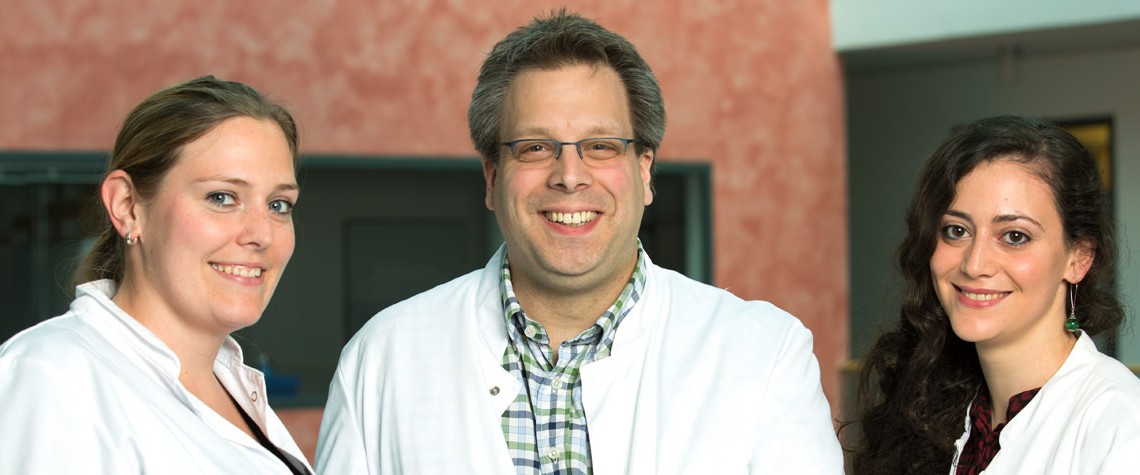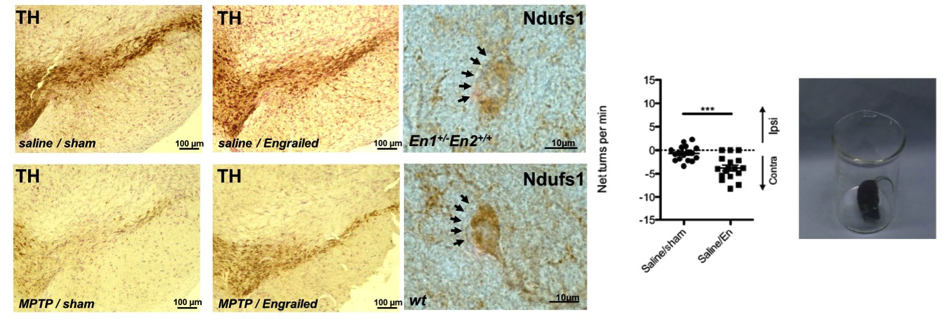Animal Models of Movement Disorders

Team: Daniel Alvarez-Fischer, MD (group leader), Franca Vulinovic, (postdoctoral researcher), Tamara Vernik (MD Student), Jonathan Ziegler (MD student), Philip Seidel (MSc student), Karin Wiegers (research technologist), Britta Meier (research technologist)
The main interest of the team “Animal models of Movement Disorders” is to better understand the pathophysiology, molecular mechanisms, and functional consequences of Parkinson disease (PD), dystonia, and schizophrenia. Based on the fact that on the one hand developmental factors, such as Engrailed, are necessary for the survival of dopaminergic neurons during life and that on the other hand both familial and sporadic forms of PD suggest mitochondrial impairment as one of the key pathophysiological elements in the disease, we are interested in the common regulatory pathways. By the use of animal models (toxin-based and genetically modified), our group investigates the regulation of mitochondrial function, neurotransmission, and behavior. We showed that Engrailed regulates mitochondrial activity on a translational level and by that protects dopaminergic neurons against MPTP. Furthermore, our results suggest a link between mitochondrial energy metabolism and dopamine synthesis which might indicate an impact of these factors also in other neuropsychiatric disorders.
Our goal for future studies is to identify (a) common pathway(s) that include(s) several of the genes linked to PD and developmental transcription factors and their role under physiological and pathological conditions.

Figure:
Left: Slices of Engrailed vs sham-infused mice treated with MPTP and saline, respectively, show that infused Engrailed protein can protect dopaminergic neurons of the SNpc against a MPTP induced demise. This is dependent on regulation of complex I subunits, such Ndufs1, by Engrailed. The figure shows a lowered level of this subunit in adult mice heterozygous for Engrailed 1.
Right: Infusion of Engrailed induces turning behavior in healthy mice.
Projects are funded by intramural grant support.
We collaborate with several national and international colleagues including Professor Günter U. Höglinger (Department of Neurology and Department of Translational Neurodegeneration at the German Center for Neurodegenerative Diseases, Technische Universität München, Germany), Professor Oliver Bandmann (Department of Neuroscience, Sheffield Institute of Translational Neuroscience, University of Sheffield, UK), Professor Andreas Hartmann (Centre de Recherche de l'Institut du Cerveau et de la Moelle Epinière UPMC/INSERM UMR_S975, CNRS UMR 7225, Pitié-Salpêtrière Group, Paris, France), Professor Alain Prochiantz (Chaire des Processus Morphogénétiques Collège de France, Paris, France), and Professor Etienne C. Hirsch (ICM and Inserm, U 975, Centre de Recherche en Neurosciences, Therapeutique Experimentale de la Neurodegenerescence, Paris, France).